- Home
- Jeannie Wycherley
The Mystery of the Marsh Malaise: Wonky Inn Book 5
The Mystery of the Marsh Malaise: Wonky Inn Book 5 Read online
The Mystery of the Marsh Malaise
Wonky Inn Book 5
by
JEANNIE WYCHERLEY
Copyright © 2019 Jeannie Wycherley
Bark at the Moon Books
All rights reserved
Publishers note: This is a work of fiction. All characters, names, places and incidents are either products of the author’s imagination or are used fictitiously and for effect or are used with permission. Any other resemblance to actual persons, either living or dead, is entirely coincidental.
No part of this book may be reproduced, distributed or transmitted in any form or by any means, including photocopying, recording, or other electronic or mechanical methods, or by any information storage and retrieval system without the prior written permission of the publisher, except in the case of very brief quotations embodied in critical reviews and certain other non-commercial uses permitted by copyright law.
Sign up for Jeannie’s newsletter: here
The Mystery of the Marsh Malaise was edited by Anna Bloom @ The Indie Hub
Cover design by Tammy.
Formatting by Tammy
Author’s Note
This book, as with the whole of the Wonky Inn series, is set in East Devon in the UK.
It uses British English spellings, idioms and vernacular.
This book is dedicated to the real Ross Baines
remembering a ‘perfect day’
Contents
Chapter 1
Chapter 2
Chapter 3
Chapter 4
Chapter 5
Chapter 6
Chapter 7
Chapter 8
Chapter 9
Chapter 10
Chapter 11
Chapter 12
Chapter 13
Chapter 14
Chapter 15
Chapter 16
Chapter 17
Chapter 18
Chapter 19
Epilogue
Where next for Wonky?
Out next from Jeannie Wycherley
Please consider leaving a review?
The Birth of Wonky
The Wonky Inn Series
Also by
Coming Soon
London in the spring.
Gritty drops of rain spattered against my skin, the backdrop of the day relentlessly grey. People, people everywhere, rushing to get where they needed to be. I stalked purposefully along, beside a busy road, wondering whether all Londoners are permanently late for meetings and appointments. Do they think that if they move quick enough they will fit more activity into their day? Is everything timetabled? Every coffee break, every trip to Selfridges or a cinema complex, every stroll in the park—slotted between the cramped, narrow lines in a bulging, well-thumbed diary, or digitally recorded on a mobile phone?
I paused outside an innocuous-seeming bookshop on Charing Cross Road—my heart beating a little too quickly as a red bus trundled by—alarmed as always by any unexpected flash of red. Whittlecombe and the peace of Devon’s beautiful countryside seemed a million miles away. Here the speed of movement, the metallic and chemical scent of fumes that perfumed the air, the noise of traffic and the cooing of pigeons, the sheer dull grimness of the historic facades, it all overloaded my senses and induced feelings of anxiety.
As if I wasn’t anxious enough.
I’d been accustomed to the pace of city life once, not that long ago really, but now everything had changed. The threat was real.
I rushed through the door of the bookshop into the labyrinth of shelves beyond, pushing it closed behind me, shutting out most of the sound. In here, the noise was muted by the millions and millions of paper pages. Volumes that soaked up volume. The sudden calm provided relief to my jangling nerves.
I quickly made my way to the very back of the shop, through the children’s section, and took the half dozen steps down into a lower floor. No windows here, just artificial lighting. Fluorescent batons that flickered and buzzed. At the very back of the shop, in the dead zone, the shelves held dozens and dozens of shabby second-hand tomes relating to early-modern and modern engineering, the growth of the UK canal network, and a history of road surfaces.
Not an overly popular section.
I placed my hand against a particularly weighty volume—the gilt lettering so faded it was impossible to read the title—and pushed hard. The shelves fell away from me. Glancing quickly behind me to ensure the coast was clear, I skipped through, and returned the secret door to its original position, pausing long enough to hear the reassuring click as it closed securely.
I followed a narrow corridor—the pea-green walls scuffed and dirty, the lighting muted—down another few steps, through another couple of anonymous doors until I found the exit. A light above the door glowed—a bright forbidding red. A state-of-the-art security system had been installed here recently, and now a camera traced all movement. I pressed the screen to the side of the door, allowing some computer somewhere to read the lines on my palm, before deciding whether to allow me access or not.
A buzz. A click. The light above the door flicked to green.
I made my way into Celestial Street.
This time however I had no meeting scheduled with Penelope Quigwell, no arrangement with Wizard Shadowmender to catch up for a cosy chat, a pie and a pint in The Half Moon Inn. Instead, I ensured my cloak was pulled up to cover my face, and turned into the drizzle, walking quickly along the darker side of the road. I ignored the brightly lit and welcoming shops, turning right into a narrow passageway known as Cross Lane instead. The space between houses here grew ever narrower, maybe eight to ten feet at its widest. At this end, closest to the shops, you could find seamstresses and tailors, the odd carpenter and cobbler. This was as far as most people ventured.
As I progressed further along the narrow lane, the houses bowed out towards me. It became increasingly difficult to pass another person without turning sideways on. Front doors opened onto front doors, and the opening between houses let only a splinter of daylight through. In places, the only illumination spilt from the windows of the ramshackle dwellings. Occasionally I passed such a window, lit by a candle, and glancing inside would spot a fire burning. Some of the little front parlours presented themselves as cosy and snug, but many others were dank and miserable. For the most part I averted my eyes, certain there were things happening behind these doors that I did not need to know about.
There were name plaques on the doors here, shadowy businesses, people who kept to themselves and guarded their secrets closely. Other travellers along this narrow pathway—and there were a surprising number of them—turned their faces away from the light and from curious gazes or indolent stares. The deeper into Cross Lane you ventured, the more likely you were to be desirous of avoiding scrutiny.
My mother Yasmin had warned me repeatedly as a small child never to stray into Cross Lane. Later, after my father had disappeared and my mother had become reclusive and angry, she’d granted me more independence. Or perhaps I had stolen it away, conveniently capitalizing on her grief as she withdrew. My own anger towards her seemed selfish and out of place now. Still, she had mentioned many times that Cross Lane was not a fitting place for a good and decent witch to be found.
But perhaps the time had come for me to relinquish any hold I had on the notion that I was good and decent.
Maybe I didn’t want to be any more.
Just as the tiny alley narrowed even further, and a few feet above my head the houses on either side practically touched—thereby robbing the lane completely of natural light while sheltering me from the rain—the row of ho
uses came to an abrupt end. I stumbled into a kind of courtyard that formed a crossroads. I had never travelled this far along Cross Lane before. I peered tentatively around. Small black signs with gold letters pointed left and right, back the way I’d come, and on… to who-knew-where. My instructions had been to take the first left, down Knick-Knack Lane.
I followed the directions given, passing more people than I’d imagined I’d see down here. No doubt about it, I was among the underbelly of my kind. These were folk who had existed on the periphery of the circles in which I’d moved my entire life. My mother and her ilk—the coven to which we belonged headed of course by Wizard Shadowmender—were all above board and decent. We practised magick as part of the mundane societies in which we moved, surreptitious and private when it came to what we did.
Here, in the backwaters behind Celestial Street, these were darker, marginalized witches, wizards, mages and sages, sorcerers and sorceresses.
Fifty yards along Knick-Knack Lane, I spotted an iron sign swinging in a slight breeze from the second storey of an Elizabethan Inn. The Web and Flame.
My destination.
The Web and Flame was everything The Half Moon Inn was not. A proper old-fashioned spit-and-sawdust pub, with roughly hewn benches and worn wooden tables. The rooms were small and dimly lit. They could have been cosy with the right décor, maybe a smattering of candles in coloured jars, and a few scattered cushions and pictures here or there. But the walls were whitewashed, and the fires burned without cheer.
A toothless and bald man in his late fifties, wearing a hessian sack as a bar apron, regarded me through hooded eyes, his expression vaguely hostile.
“Good afternoon,” I said, standing tall, attempting to exude a confidence I didn’t truly possess.
“What can I get you?” he asked.
I scanned the ales on display and opted for a glass of Hoodwinker. When he poured it, the colour was dark and rich, so I expected it to taste bitter, and yet when I took a mouthful I found it to be light and fresh, citrusy. A hoodwinker indeed.
The bartender took my money then nodded at a table behind me. I turned.
The pub was largely empty and the few people inhabiting the tables, stared disconsolately into the bottom of their pint glasses and tankards, minding their own business. Only one man looked my way.
I walked towards him, self-conscious under his gaze, my stomach fluttering. I paused at his table and placed my hand on the wooden chair facing him.
“Is this seat taken?” I asked.
He was a wizard, a man in his mid-thirties perhaps, handsome, with dark hair that curled around his collar, and equally dark eyes that glittered at me with unconcealed interest.
“That depends.” He cocked his head and waited.
I experienced a moment of uncertainty. I’d been playing out this meeting in my mind for over a week, and now here I stood, and I could feel my resolve slipping. Had I found the right man or not? I had an envelope full of money burning a hole in a hidden pocket in my cloak. The last thing I wanted to do was to hand it over to someone completely unworthy.
We locked gazes. I could see amusement in his eyes, but also a steely determination. He wasn’t someone who would suffer fools.
That made my mind up. I hoisted the heavy envelope from my pocket and lay it on the table in front of him. He watched me do so, and smirked. I kept my fingers pressed against the envelope, driving my weight down through them, impaling the money safely into place. “Viscus in loco.”
He laughed and sprawled back against the wall.
“Do sit down, Ms Daemonne,” he said, keeping his voice low. “You’re making the place look untidy.”
I pulled the chair out, and as I did so, quick as a flash he reached out. Tapping the envelope once, he scooped it up easily enough, palming it so that it disappeared up his sleeve.
I settled myself in the chair, smiling. “I seem to have found the right place.”
“This is only half of what we agreed,” the man said, patting the side of his jacket.
He was good. “I know. You get the other half when you join me at Whittle Inn.”
The man mock-pouted. It didn’t suit him. “You don’t trust me.” A statement not a question.
“Of course not.” I folded my arms and studied his features carefully. Tanned skin, full lips, a little dimple in his chin, wrinkles around eyes framed by the most amazing eyelashes, long and black. He liked to smile.
“That’s good to hear.” He regarded me a little longer before leaning across the table, close enough that I could have kissed him had I so desired. I felt his breath on my face. “You wear your heart on your sleeve.”
I nodded, pressing my lips together.
“Your magick is weak.” He tapped his side again where the money was now safely stowed.
“If it was stronger, then I wouldn’t need you,” I retorted, my words laden with ice.
“Why should I help you?”
I widened my eyes in surprise. He was a gun for hire. “Because I’m paying you handsomely to do so.”
He gave a slight head shake. “I don’t need your money.”
“You quite clearly do.” I couldn’t help but contradict him. His clothes were good quality but well worn. If he had any wealth at all, I wouldn’t have found him here in Knick-Knack Lane. He’d have been lording it somewhere less inauspicious and disreputable.
His eyes glittered with a flash of annoyance. He had pride. Interesting.
“Is money all that matters to you?”
“No, of course not,” I protested. Not at all. That’s why I’m risking a lot of it throwing it away on someone like you.
“Then don’t presume to judge me by those standards, Ms Daemonne.”
I cast a quick look over my shoulder. Everyone appeared to be keeping their own counsel, but you could never tell. I didn’t like that he kept using my name.
“You’re a fool if you think no-one will know you’ve been here,” he said quietly.
“I’m desperate.”
He flung his head back and roared with laughter. “Obviously. Otherwise you wouldn’t be seen with me. I should be insulted.”
Should I apologise that I’d hurt his feelings? I didn’t have time for this. I rubbed my eyes wearily. He watched me do so and reached out to take my hand. I tried to snatch it away, but he pulled it towards himself, turning it over so that it was palm up, and read what he saw there.
When he looked up again, his face had softened.
“I can’t help you,” he said. “You’re in too deep.”
“Then give me my money back,” I demanded, gritting my teeth in annoyance.
A sharp shake of the head. “I can’t do that.”
“Then you should be a man of your word and abide by the contract implicitly accepted when you took the envelope.”
He grinned, but without humour. “If you wanted an honourable man, you would be undertaking your business in The Half Moon inn.”
I pushed my chair back in annoyance and rose.
“If you were everything you claimed to be, you’d be sitting on the Council of Witches,” I retorted, and whirled away in fury. I marched out of the pub, not caring who watched my sulky exit.
I’d made it almost as far as the crossroads when I heard feet running after me. Instinctively, imagining it to be a thief, I turned to ward off a blow, but it was only my dark-haired acquaintance. He reached out to grab my arm, and when I tried to pull away, still angry with him, he fell into step beside me.
“You’re beautiful when you’re angry.”
“Take your hand off me. I’m not interested.” I pushed him away and strode into Cross Lane, where it was too narrow for him to walk with me. He followed on behind.
“You want to know whether he’s still alive, don’t you?”
I froze, then slowly swung to face him, dreading to see mockery in his eyes.
His face looked deadly serious, grim almost.
“Is he?”
He stepped
towards me, his black eyes boring into mine. “He’s a mortal, you know? Expendable.”
I lifted my left hand—where my engagement ring, a large black stone set between two diamonds sparkled with life in the subdued light—and placed it on the necromancer’s chest.
“He means the world to me. Now tell me whether he’s alive.”
“I sense thunder in your heart, Alf.” Wizard Shadowmender strolled beside me as we wandered through Speckled Wood. Ostensibly we were inspecting the boundaries that formed the bulk of Whittle estates. Speckled Wood gently transitioned into forest land here, the forest that stretched north and east towards the hills, with Abbotts Cromleigh lying to the north-west.
“You don’t have to be a wizard to know that.” I kept my tone light but even so, the curt response hit home and proved his point. I winced inwardly.
He took my arm. “Come, come my dear. I hate to see you like this.”
“Has there been any word?” I knew what the answer would be. I must have asked the same question of everyone I’d met who might have had any inkling at all. Have you heard anything about George? Do you know where he is? Is he alive?
I was a broken record.
“You know if there had been, I would not have kept it from you. You would be the very first person I’d inform.”
“Yes.” I sighed. We’d entered a clearing, halting at the edge of a large pool of water, listening to the toads calling around us. The birds tweeted in the trees on the edges, totally unconcerned about us. About anything.
I pulled my arm away from Wizard Shadowmender and, manoeuvring myself over the rocks, crouched by the pool. In this part of Speckled Wood, the ground dipped in a large hollow, and water collected here, fed in part by a series of freshwater springs that ran both overland and under the ground. In turn this pool, when it was full, spilled over to be consumed by the marshes. After a wet few months, both the pool and the marshes were swollen. Everywhere I looked, the forest here teemed with life. Frogs and toads, and plenty of insects skating on the water, or alighting on the algae that formed as part of the natural bio-system. The birds were attracted to the area too, thanks to the sheer abundance of creepy crawlies that skittered around, the pond plants growing thigh high, sheltering and disguising predators of all kinds.

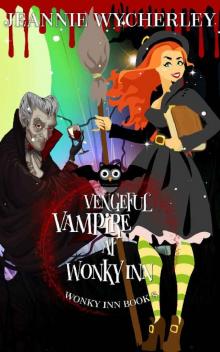 Vengeful Vampire at Wonky Inn: Wonky Inn Book 8
Vengeful Vampire at Wonky Inn: Wonky Inn Book 8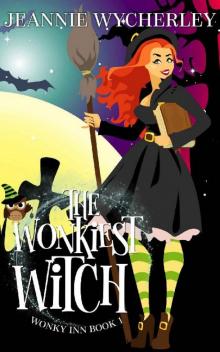 The Wonkiest Witch
The Wonkiest Witch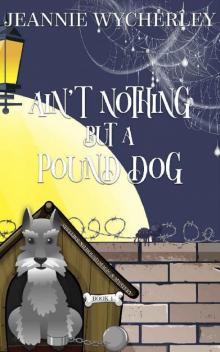 Ain't Nothing but a Pound Dog
Ain't Nothing but a Pound Dog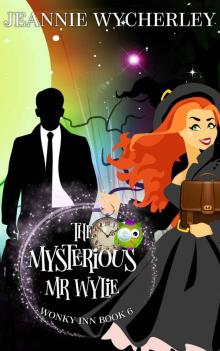 The Mysterious Mr Wylie: Wonky Inn Book 6
The Mysterious Mr Wylie: Wonky Inn Book 6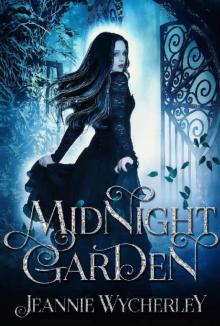 Midnight Garden
Midnight Garden Witching in a Winter Wonkyland: A Wonky Inn Christmas Cozy Mystery
Witching in a Winter Wonkyland: A Wonky Inn Christmas Cozy Mystery The Great Witchy Cake-Off
The Great Witchy Cake-Off The Great Witchy Cake Off: Wonky Inn Book 7
The Great Witchy Cake Off: Wonky Inn Book 7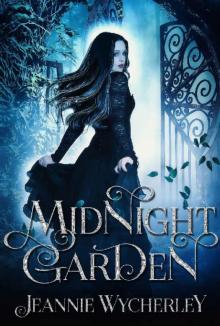 Midnight Garden (The Extra Ordinary World Novella Series Book 1)
Midnight Garden (The Extra Ordinary World Novella Series Book 1)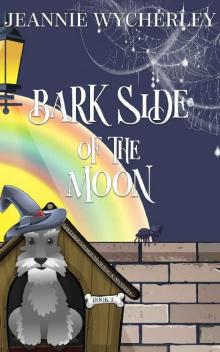 Bark Side of the Moon: A Paranormal Animal Cozy Mystery (Spellbound Hound Magic and Mystery Book 3)
Bark Side of the Moon: A Paranormal Animal Cozy Mystery (Spellbound Hound Magic and Mystery Book 3) A Gaggle of Ghastly Grandmamas: Wonky Inn Book 9
A Gaggle of Ghastly Grandmamas: Wonky Inn Book 9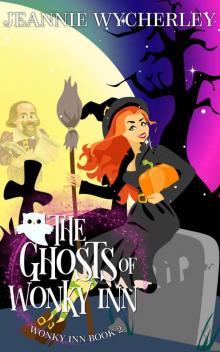 The Ghosts of Wonky Inn: Wonky Inn Book 2
The Ghosts of Wonky Inn: Wonky Inn Book 2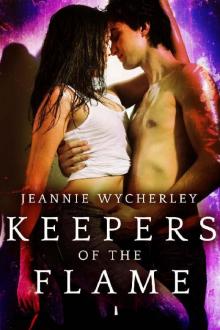 Keepers of the Flame: A love story
Keepers of the Flame: A love story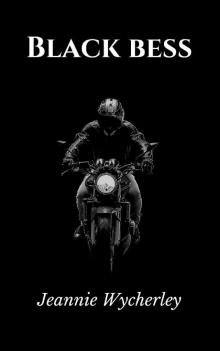 Black Bess
Black Bess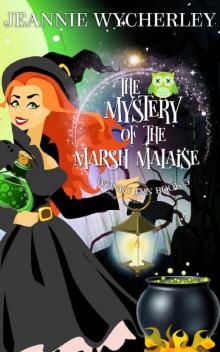 The Mystery of the Marsh Malaise: Wonky Inn Book 5
The Mystery of the Marsh Malaise: Wonky Inn Book 5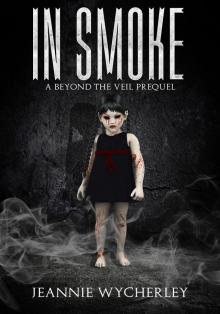 In Smoke eBook ready
In Smoke eBook ready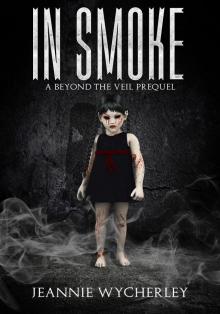 In Smoke
In Smoke